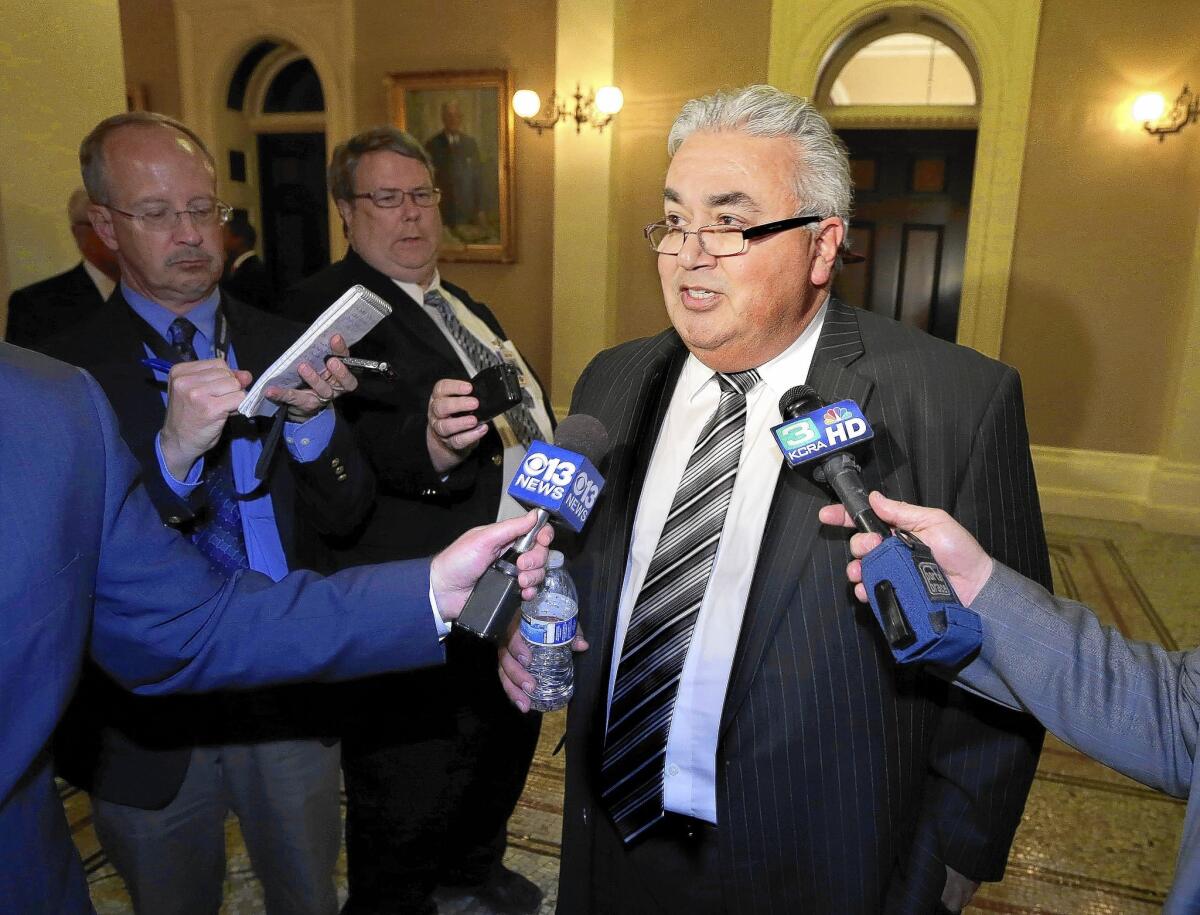California Legislature considers ethics reform bills

- Share via
SACRAMENTO — Trying to counter ethics scandals in which lawmakers stand accused of voter fraud, bribery, money laundering and other misdeeds, Democratic leaders Thursday proposed sweeping changes to state political laws aimed at restoring public confidence in the Legislature.
The proposals, which Gov. Jerry Brown has yet to embrace, would ban lawmakers and other state officials from accepting such gifts as spa treatments, golf games and tickets to Lakers games.
Officials could take other gifts, but only if their worth totaled $200 or less annually from any source — down from the $440 now allowed. And politicians would have to report campaign contributions more frequently.
The scandals of recent months have spawned more than a dozen measures by various lawmakers, addressing fundraising rules, lobbyists and travel by state officials. Thursday’s more visible effort followed the back-to-back departures of two Democratic state senators, both now on paid leave, that this week cost the party its supermajority in the upper house.
“There is no question that recent events are testing the public’s faith in how our government does its work,” said Sen. Ricardo Lara (D-Bell Gardens), head of a special Senate ethics panel. “The hard work of the Legislature is too important to be sidetracked by issues of accountability of a few. We need to restore the public trust.”
Senate President Pro Tem Darrell Steinberg (D-Sacramento) created Lara’s committee after the Jan. 28 felony conviction of Sen. Roderick D. Wright for perjury and voter fraud. On Feb. 21, Sen. Ronald S. Calderon was indicted on charges of accepting nearly $100,000 in bribes, among other crimes. Both senators have denied wrongdoing.
The timing of the new package is no coincidence, said Jessica Levinson, a Loyola Law School professor who studies governmental ethics. “Oftentimes the only silver lining that comes as a result of scandals is reform.”
The question, she said, is “whether this is real reform or politically expedient reform, or both.”
Brown’s aides said the governor supports efforts to reform California’s ethics laws but was caught off guard by Thursday’s proposals. He objected that the state’s main ethics watchdog, the Fair Political Practices Commission, might endorse the package immediately, before it had been reviewed in a public hearing. The agency helped craft the package.
As with most fresh legislation, Brown had no comment on the actual legislation, an aide said.
Opposing the suggested changes would be tricky for Brown or other officials in this election year. Brown is widely favored to win in November, but that is eight months away. In addition, it is not clear that Senate Democrats will be able to recapture the two-thirds majority lost when Montebello resident Calderon, charged on 24 felony corruption counts, took a leave of absence this week.
The party will need every vote it can get in legislative elections, especially in some newly drawn Senate districts being tested this year for the first time.
Calderon’s departure came on the heels of Wright’s leave, after Wright, who represents an Inglewood district, was convicted of lying about where he lived when he ran for office. In addition, Sen. Tom Berryhill (R-Modesto) is fighting an administrative law judge’s recommendation that he pay up to $35,000 in fines for laundering contributions to his brother’s Assembly campaign.
And 37 public officials, including Brown and Steinberg, recently received notice from the Fair Political Practices Commission that their campaigns had received improper contributions in the form of expensive wine, liquor and cigars provided by lobbyist Kevin Sloat at fundraisers in his home.
Lobbyists are forbidden to make contributions to state candidates.
Thursday’s bills would need a two-thirds vote in each house to pass the Legislature. They received initial support from Republicans.
“On first reading, they are ideas that definitely have merit,” said Peter DeMarco, a spokesman for the Senate Republican Caucus.
He noted that the prohibition on many entertainment gifts was offered by a GOP lawmaker years ago and sidelined by Democrats.
In addition to spa visits, golf outings and the like, the bills would bar state officials from accepting concert and theme park tickets, hunting and fishing trips and cash and gift cards from special interests and others.
Such gifts are “indefensible” for legislative purposes, said Sen. Kevin De León (D-Los Angeles), a coauthor of the three bills that he called “long overdue.”
The measures would also require politicians’ fundraising and spending to be reported quarterly, rather than twice annually, in non-election years, to give voters more timely information on who supports candidates for office. They would also ban lobbyists from hosting political fundraisers at their homes.
Gary Winuk, chief of enforcement for the Fair Political Practices Commission, called the new bills “some of the most significant reforms to ethics laws in 20 years,” when California’s Political Reform Act was last overhauled.
But the measures do not address the hundreds of thousands of dollars in travel provided to legislators and other officials each year from groups funded by special interests. Steinberg and Lara said such travel is often educational, and taxpayers would not want to bear the cost.
Still, they could give life to the other ethics proposals, many of which might have died on the vine.
Sen. Jerry Hill (D-San Mateo), for example, has a measure that would place an annual $5,000 limit on travel-related gifts to an elected official from a single source.
Sen. Alex Padilla (D-Pacoima), a candidate for secretary of State, has bills that would prohibit lawmakers from raising campaign funds for more than three months at the end of each legislative session — when many key bills pass or die — and make it illegal for candidates to raise money for more than one office at a time, which is currently allowed.
More to Read
Sign up for Essential California
The most important California stories and recommendations in your inbox every morning.
You may occasionally receive promotional content from the Los Angeles Times.











